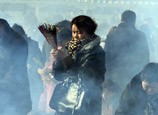
Demographic policy change aside, the government can also use a number of systematic restructuring means to reduce the impact of the decreasing working-age population on economic growth. For example, experts have suggested the hukou (house registration) system be reformed to enable more migrant workers to settle down or at least stay longer in cities and thus contribute more to local economic growth. At present, migrant workers in their 40s return home in the countryside. But if policies become friendlier toward them, experts say, they could work in cities until they are 50 or even older.
Policies encouraging technological upgrade and innovation are also crucial for fuelling growth in China. So far, the country's growth has been driven mainly by labor, material and capital inputs. But if it wants to maintain a stable economic growth rate, it must seek new ammunition on the technological front.
The government also has to improve overall national productivity by encouraging fair competition among enterprises. It should deepen market-oriented reform so that monopolies can be broken and enterprises can compete on an equal footing in all fields. Once such an economic regime is established, enterprises with higher productivity will stand out, pushing up the country's overall productivity and offsetting the impact of the drop in the working-age population.
More importantly, however, China must reshape its economic growth philosophy so that it can tolerate lower growth rates because of its changed demographics. Economists estimate that because of the declining working-age population, China's reasonable growth rate, or growth rate that is in line with its basic economic conditions, slumped from about 10 percent in the 2006-10 period to about 7 percent between 2011 and 2015. And it is expected to drop further to about 6 percent in the 2016-20 period.
Therefore, the government should avoid using large-scale loose monetary and fiscal policies to push up the growth rate to its potential limit. While such policies may temporarily benefit economic expansion, economists warn that they could create financial bubbles that would ultimately damage economic health.
Japan's case is often cited when it comes to failure in balancing the economic growth rate and stimulus policies. When the ratio of Japan's working-age population to the total population hit the trough after the 1970s, its growth started slowing down causing panic both in the government and among the public. The ensuing stimulus measures, characterized by loose monetary policy, pro-active fiscal policy and industrial and regional support policies, instead of pulling the economy out of recession created the new problem of bubble economy.
Given the appalling consequences of such policy mistakes, China should draw a lesson from its neighbor and refrain from adopting excessive stimulus policies to reverse the economic downturn.

















 Slacklife in Beijing: China's 'No 1 Slackliner'
Slacklife in Beijing: China's 'No 1 Slackliner'


![]()
